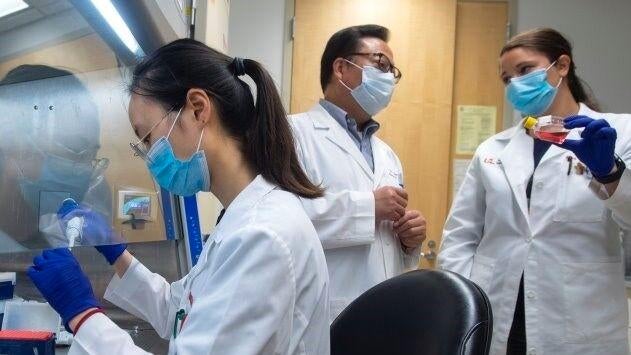UofL receives grants for Covid research
Published 12:45 pm Tuesday, June 6, 2023

- Immunologist Jun Yan (center) is leading a team of University of Louisville researchers to understand and prevent a serious complication that arises in some Covid-19 patients. UofL photo
KENTUCKY TODAY
Researchers at the University of Louisville have received federal grants totaling over $6 million for their work in understanding and preventing a serious complication that appears in some Covid-19 patients.
Two grants from the National Institutes of Health (NIH) of $5.8 million will help the researchers expand their work to better understand and prevent immune system dysregulation responsible for acute respiratory distress, the condition responsible for serious illness and death in some Covid-19 patients.
A separate $306,000 NIH Small Business Innovation Research grant will support early testing of a compound developed at UofL as a potential treatment.
During the pandemic, health care providers worked tirelessly to treat patients who became seriously ill with Covid-19. Some of those patients developed severe lung disease known as acute respiratory distress syndrome (ARDS) due to an excessive response of the immune system often called cytokine storm.
As they treated these critically ill patients, physicians and other providers at UofL Health shared their clinical insights and patient samples with researchers at UofL to discover the cause of the immune system overresponse.
“At one time we had over 100 patients with Covid in the hospital,” said Jiapeng Huang, anesthesiologist with UofL Health, professor and vice chair of the Department of Anesthesiology and Perioperative Medicine in the UofL School of Medicine. “Once they were on a ventilator, mortality was about 50%. We were looking at this issue to see why some people would do well while some developed bad lung disease and did not do well or died,”
The UofL researchers, led by immunologist Jun Yan, discovered that a specific type of immune cell, low-density inflammatory neutrophils, became highly elevated in some Covid-19 patients whose condition became very severe. This elevation signaled a clinical crisis point and increased likelihood of death within a few days due to lung inflammation, blood clotting and stroke. Their findings were published in 2021 in JCI Insight.
With the new NIH funding, Yan is leading research to build on this discovery with deeper understanding of what causes a patient’s immune system to respond to an infection in this way and develop methods to predict, prevent or control the response.
“Through this fruitful collaboration, we now have acquired NIH funding for basic and translational studies and even progress toward commercialization of a potential therapy,” Yan said. “That’s why we do this research – eventually we want to benefit the patients.”






